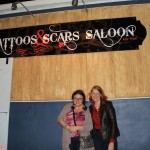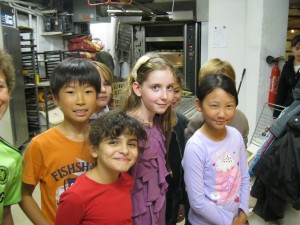
“You never know how American you are until you leave the country,” according to my nine-year old daughter. She says she didn’t even notice her American accent until she came to Paris.
I hadn’t realized that the corollary could be true for me, too: I didn’t know how French I was until I left France.
I was lucky enough this year (it felt like winning the lottery) to receive the Joyce Horton Johson Award from the Key West Literary Seminar. This granted me a fabulous, literary-star-studded week of panels, lectures, and workshops in the old stomping grounds of Tennessee Williams and Ernest Hemingway. I was also honored to give a reading with the very talented Scott Brennan and Brooks Whitney Phillips. Even if this was not my physical home, it seemed like my artistic one.
As soon as I landed at the Key West Airport, though, you could peg me as a foreigner by my black ballet flats. It became clear my first day that I’d have to buy sports sandals to scale the streets like a native. And flip flops.
My table manners were weird, too. “Why are you eating the pretzel bread with a fork and knife?” my friend Leigh asked.
“That’s what we do in Paris,” I said.
She put her hands up as if to point out that we were in a sports bar at the southernmost edge of North America.
The next day I cut my pizza in tiny wedges. When Leigh looked at me funny, I shrugged, as if to say, “It’s what the Parisian guy sitting next to me on the plane did.”
I became addicted to a morning ritual of cafe con leche in a styrofoam cup from a take-out Cuban stand attached to a landromat because, as I told Leigh, “it tastes exactly like an eclair au cafe.” It reminded me of my favorite bakery in Montparnasse.
I wore button-down shirts. And even tucked them in. Not exactly beachscape dressing. When I saw a woman in skinny jeans, a black blazer and heels one night, I couldn’t restrain myself from telling her, “You look like you’re in Paris.”
She humored me. “People dress like this in New York, too.”
Which is true, but New York isn’t like the rest of America, is it? Of course, neither is Key West. This idyllic island ninety miles from Cuba feels like the setting of a magic realism novel. An enchanting and unreal place where the streets are full of feral cocks. The sun is so bright it makes you want to write a bullfight scene or at least speak in telegraphic, Hemingway-ese. Chickens cross the street for no reason at all (apparently, they belong to no one, like pigeons), and the sky is peppered with seagulls. There are more art galleries than grocery stores. You can hail a pink taxi with the wag of a finger or ride a rented bike in the street or on the sidewalk. Guava paste outnumbers grape jelly ten to one.
So maybe I haven’t really been back to America yet. Or maybe there isn’t only one country to return to.
Our notion of home is complicated these days, isn’t it? On my flight to Florida, I sat next to a Spanish-born Parisian who spoke English perfectly (which he learned from his obsession with Marvel Comics and his American girlfriend). A music journalist, he works for a magazine devoted exclusively to reggae, and he was taking a business trip to Jamaica. The place where he felt most at home.
On my trip back to France, my seatmate was a Finnish woman and her newly adopted toddler from Ecuador. She spoke to the little girl in a mix of Finnish and Spanish and carried an American novel in English. They were on their way home.
And so was I. But right before I left for the airport, I asked Leigh if she wanted my flip flops. I couldn’t wear them in Paris.
Photo credit: Chuck Kramer.



